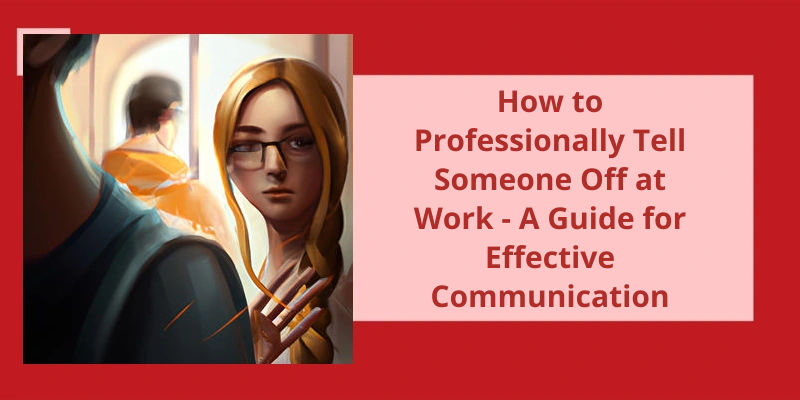Navigating difficult conversations at work can be tricky. It’s important to communicate your frustrations in a professional and effective manner, without damaging relationships or creating a hostile work environment. Sometimes, you need to tell someone off in a classy manner without sounding condescending or rude. It’s all about finding the right words and tone to convey your message while maintaining a level of respect and kindness. With the right approach and mindset, you can turn a tense situation into a valuable learning experience and strengthen your professional relationships. In this article, we’ll explore ten effective and classy ways to tell someone off at work.
How Do You Politely Tell Someone to Go Away?
Telling someone to go away can be a sensitive situation, but sometimes it’s necessary for various reasons. It’s important to approach the situation politely and with respect to maintain a positive relationship with the person.
One way to tell someone to go away politely is by expressing gratitude for their visit or presence, but indicating that it’s time for them to leave. Utilizing phrases such as “Thank you for stopping by, but I’ve some things to attend to now, so Im going to have to ask you to leave” can convey politeness while still achieving the desired outcome.
Another approach is suggesting that it’s time for the person to head home, especially if it’s late or after a gathering has come to an end. Saying something like “It’s getting late, and I think it’s best if you head home now” acknowledges their presence and politely requests that they leave.
If the person is overstaying their welcome, it may be appropriate to use phrases such as “I appreciate your company, but I need some time to myself now. Could you please go?”. Using this type of language addresses the issue without making the person feel like they’re being rejected.
Using polite language while maintaining a firm tone can also be an effective way to tell someone to go away. Saying phrases such as “Im sorry, but I need you to leave now” with a calm but assertive tone can make the message clear without being perceived as rude or aggressive.
Lastly, using humor can be a way to diffuse tension and politely ask someone to leave. Saying something like “Well, it’s been great having you over, but I need to start getting ready for bed now. Can I show you the door?” can make the person feel at ease and allow them to leave without causing any negative feelings.
Overall, the key to politely telling someone to go away is to approach the situation calmly and respectfully, while still achieving the desired outcome. It’s essential to choose language that’s clear and concise while avoiding offending or upsetting the person. By following these guidelines, it’s possible to navigate this delicate situation with tact and diplomacy.
What Is an Example of Telling Someone Off?
Telling someone off is a common form of communication that involves expressing anger or disappointment towards someone who’s done something wrong. It typically involves using stern or harsh language to convey disapproval or chastise the recipient of the communication. For instance, a teacher may tell off a student for disrupting a class or being disrespectful, while a parent may tell off their child for breaking a rule or causing harm to another person.
In order to tell someone off effectively, it’s important to use clear and direct language that conveys your message without being overly aggressive or confrontational. This may involve expressing your feelings in a calm and controlled manner, using “I” statements to describe the impact of the recipients behavior on you or others. It may also involve providing specific examples of the inappropriate behavior and suggesting alternative actions or solutions.
While it can be an effective tool for correcting inappropriate behavior, it’s important to use it with care and compassion, and to recognize the impact that it may have on relationships and individuals.
How Can Someone Respond to Being Told Off?
One can respond to being told off by acknowledging the criticism, expressing understanding and looking for ways to improve moving forward. It’s also important to stay calm and respectful, and not to escalate the situation.
Source: TELL SOMEONE OFF definition | Cambridge English Dictionary
While it’s always great to have friends and family over, sometimes it can be difficult to know how to tell them it’s time to leave. However, there are some polite ways to encourage them to head home without causing offense or hurt feelings.
How Do You Politely Tell Someone to Leave?
However, not everyone is socially aware enough to pick up on these subtle hints. In those cases, it’s necessary to have a more direct conversation with the person in question. It’s important to approach the conversation with politeness and respect, but also with firmness and clarity.
One effective approach is to start by expressing appreciation for the persons company and the time spent together. This can make it easier to transition into the topic of leaving. For example, “Thank you so much for coming over, it was great catching up with you. I hate to cut the evening short, but Im actually feeling pretty tired and could use some alone time.”
Another approach is to suggest alternative activities that the person can do elsewhere. For example, “I think Im going to wind down for the night, but maybe you could check out that new bar that just opened downtown. It seems like your kind of scene.”
In some cases, it may be necessary to be more direct and explicit in requesting that the person leave. It’s still important to maintain a respectful tone and avoid being confrontational. For example, “Hey, I don’t want to be rude, but I actually need to be alone now. So if you could wrap up and head out, that would be great.”
It may also be helpful to set clear boundaries and expectations upfront. For example, if you’re inviting someone over for a specific amount of time, let them know that in advance. This can help avoid any confusion or awkwardness later on. Additionally, if you’ve other plans or commitments, it’s okay to let the person know that you need to leave at a certain time.
Ultimately, having a frank and respectful conversation about leaving can be uncomfortable, but it’s an important skill to master. With practice and patience, it’s possible to politely and effectively communicate your needs and boundaries, while still maintaining positive relationships with friends and loved ones.
How to Prepare for Having the Conversation About Leaving in Advance.
- Think about what you want to say
- Consider the other person’s feelings
- Choose the right time and place
- Be honest and clear
- Listen to their response
- Respect their decision
- Make a plan for moving forward
- Take care of yourself emotionally
- Consider seeking professional help
When it comes to telling someone to do something at work, there are ways to do it that are both effective and respectful. It’s important to remember that everyone has feelings, and being approached in a gentle, helpful manner can make a big difference. Starting with something positive, avoiding sounding authoritative, utilizing questions when appropriate, providing evidence, offering help, and using a gentle, helpful tone are all strategies that can help you communicate your message in a way that’s well received.
How Do You Tell Someone to Do Something Nicely at Work?
When it comes to telling someone to do something at work, their initial reaction might not always be positive. After all, nobody likes being told theyre wrong or that they need to do something differently. However, there are ways to approach this situation in a more positive and constructive way. One effective technique is to start with something positive. This can be a compliment on a job well done, or a recognition of their skills and expertise in a particular area. By starting off on a positive note, you can help to build their confidence and make them more receptive to your feedback.
Another important factor to consider is the tone of your message. It’s crucial to avoid sounding authoritative or condescending, as this can quickly erode your relationship and trust with your colleague. Instead, try to use a gentle, helpful tone that demonstrates your willingness to collaborate and support them in their work. Similarly, it’s wise to avoid using phrasing that sounds accusatory or judgmental, such as “youre doing this wrong” or “you need to improve in this area”.
Utilizing questions is another useful strategy when communicating with your coworker. This can help to engage them more fully in the process and encourage them to take ownership of the task or project. By asking open-ended questions, you can help them to reflect on their work and identify areas where they might need additional support or guidance. Additionally, by offering to help and provide feedback, you can further demonstrate your commitment to their success.
Providing evidence and reasoning behind your request can also be helpful in facilitating a constructive conversation. By presenting your ideas in a clear and logical way, you can help to ease any potential tension or confusion surrounding the task. This can also be an opportunity to offer suggestions or alternatives that might make the task more manageable for your colleague.
In summary, when telling someone to do something at work, it’s important to approach the situation in a positive and constructive way. This can involve starting with something positive, using a gentle and supportive tone, utilizing questions, providing evidence, and offering help. By demonstrating your willingness to collaborate and support your colleague, you can help to create a more positive and productive work environment for everyone.
Conclusion
Overall, the ability to professionally tell someone off at work is an essential skill to master in a professional setting. It requires a level of tact and diplomacy to ensure that the other person understands their mistake without causing any unnecessary tension or conflict. These ten classy ways to tell someone off not only show a high level of professionalism but also demonstrate a willingness to learn and work collaboratively. Whether in a leadership role or not, embracing these approaches can help cultivate healthy communication and respect within a team, contributing to a positive working environment and overall success.






